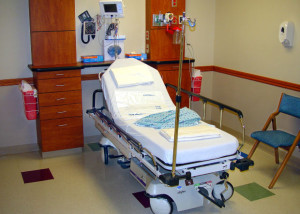NO FEES unless we recover money for you. |
Call 205-391-0618
Office Locations: Tuscaloosa Birmingham
Blog
Retained Surgical Items & Alabama Malpractice Claims
Feb 17, 2014 - Medical Malpractice by Cross & Smith
In 2006, a female patient underwent a hysterectomy at a hospital in Demopolis, about an hour outside of Tuscaloosa. Everything seemed to have gone fine.
Then five years later, she sought the assistance of a rheumatologist, as she was experiencing intense pain. An x-ray revealed the presence of a hemostat clamp, lodged in her abdomen – allegedly left there negligently by the surgeon who had conducted the earlier operation.
Prior to having the clamp removed surgically, she suffered debilitating pain and life-threatening infections. She later filed a lawsuit, Tucker, Jr. v. Tombigbee Healthcare Authority, which was just recently reviewed by the Alabama Supreme Court.
Our Tuscaloosa medical malpractice attorneys know that such events – referred to as “retained surgical items” – are considered by those in the medical profession to be so negligent and preventable that they are referred to as “never events.”
Unfortunately, they happen a lot more than never. Try 4,500 to 6,000 times a year.
Complications can be life-altering or even life-threatening. Sometimes, patients may lose intestines or parts of other organs. In some cases, they do not survive.
Incidents like what happened in the Tucker case are only somewhat rare in that the device left behind was an actual instrument. Items like clamps, forceps, needles and tool fragments – a 2013 report from the Joint Commission, a non-profit health care watchdog, found that there were approximately 800 cases of surgical instruments being left inside patients from 2005 through 2012.
In all, these resulted in 16 deaths, and in an overwhelming 95 percent of cases, patients had to stay longer in the hospital. Most commonly, these incidents occurred in operating rooms, labor and delivery rooms and ambulatory surgery centers or labs.
However, most of the time what is left behind are sponges. These are cotton-based, gauzy-type material that is most frequently used to soak up blood or other kinds of fluids during surgical procedures.
These account for about two-thirds of retained surgical items claims.
Most of the time, these incidents occur when an operation was performed on an emergency basis. The Joint Commission report indicated that emergency procedures were four times more likely to result in a retained surgical instrument than a planned procedure.
Though every case of malpractice is different, usually the root of the problem stems from the fact that too many hospitals use old-fashioned methods in order to avoid “losing” a sponge inside a patient. It usually involves a manual count by an operating room nurse. He or she is responsible for counting and recounting and then counting again.
But sometimes, the environment in an operating room is chaotic. Someone loses track. A sponge (or other item) is missed.
What is especially troubling about these incidents is that we have technology now that could significantly reduce these problems. There are devices that can track the sponges through radio-frequency tags. A study recently published in The Journal of the American College of Surgeons found that radio frequency tags were able to catch dozens of left-behind sponge incidents at a single hospital out of some 3,000 procedures over the course of a year.
Another study at a children’s hospital found that these devices reduced the incidents of retained items by as much as 50 percent.
Yet, fewer than 15 percent of medical facilities use this technology.
That means we are going to continue to see these kinds of unacceptable oversights.
The average cost for a patient with a retained surgical tool is an extra $167,000, according to a report by CBS News.
However, it is imperative that you contact an attorney as soon as possible in the event such an item is discovered.
Additional Resources:
Tucker, Jr. v. Tombigbee Healthcare Authority, Feb. 7, 2014, Alabama Supreme Court
Categories
- Amputation
- ATV/SUV Rollover Accidents
- Bessemer
- Birmingham
- Bus Accidents
- Car Accidents
- Construction Accidents
- Dangerous Products/Liability
- Defective Medical Devices
- Drunk Driving Accidents
- Firm News
- Medical Malpractice
- Motorcycle Accidents
- Nursing Home Neglect
- Personal Injury
- Pharmaceutical Litigation/Dangerous Drugs
- Premises Liability
- Train Accidents
- Truck Accidents
- Tuscaloosa
- Uncategorized
- Workers' Compensation/Work Injury
- Wrongful Death
Archives
Get a Free Consultation No Recovery. No Fee.
Hear What Our Clients Have To Say
"I highly recommend Cross & Smith. They are an excellent law firm with attorneys who care greatly about the individuals they are representing. "
Posted By: Robert Upchurch

